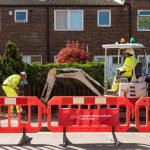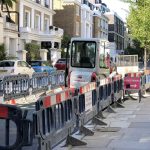Ofcom Opens Probe into BT Compliance with Broadband USO UPDATE

Ofcom has this morning opened an investigation to examine whether or not BT is complying with their obligations under the new UK Universal Service Obligation (USO), which requires them to help deliver at least a 10Mbps broadband download speed, upon request, to those in poorly served areas.
The ambition of the USO was to ensure that everybody in such a location could request a 10Mbps service, although the reality has always been that some areas would simply be too expensive for even the new obligation to tackle. Over the past few months, since the new rules were introduced, we’ve thus seen many examples of people being hit with quotes for excess costs that run from tens of thousands and all the way up to over £1m.
The situation has been exasperated by some significant inconsistencies in BT’s USO quotes (based on Openreach‘s data) and their processes, as well as plenty of mixed messaging (we’ve already explored this in some detail – high USO costs examined). Suffice to say that the accuracy of BT’s quotes and how they’re pieced together is now coming in for a lot of scrutiny.
Advertisement
At the end of last week the Government’s Digital Infrastructure Minister, Matt Warman, took the situation a step further by calling on BT and Ofcom to find a “resolution” (here). Today the regulator has responded by launching an investigation in relation to BT’s compliance with its obligations as a broadband USO provider, although it should be said that they were already considering enforcement action before the MP’s intervention.
Ofcom’s Broadband USO Statement
Ofcom has worked to implement the USO as quickly and efficiently as possible. Following consultation, we designated BT as a Universal Service Provider and imposed regulatory conditions setting out how it must provide USO connections to eligible consumers.
Under the legislation, customers can request a USO connection from BT if they cannot currently receive affordable broadband services with speeds of at least 10 Mbit/s and upload speeds of at least 1 Mbit/s (among other technical parameters). Upon receiving such a request, BT must assess the costs of providing that connection and, where this is less than £3,400, BT must provide the connection. Where the assessed costs exceed that amount, BT must also provide the connection if the customer is willing to pay the excess costs.
Ofcom’s conditions set out how BT should assess the costs of providing a connection. In particular, as required by the legislation, BT must take into account that costs may be shared among other customers who could use the same infrastructure. BT must apply this methodology to calculate the costs of each requested connection.
While the cost of some connections will be high due to the remoteness of many of these premises, we are concerned that BT may not be complying with the regulatory conditions correctly where it assesses excess costs for a given connection. This could result in some customers’ quote for a connection being higher than necessary.
The regulator will now gather evidence before deciding what further action to take (a decision on that could come by the end of this year). However, the biggest barrier here is that it remains an inherently difficult task to accurately estimate the cost of an FTTP deployment to areas where no good fixed line or wireless solutions exist (FTTC can technically also still be used but these days full fibre is the expectation).
A proper engineering survey is often required, as opposed to a desktop quote, but that costs more time and money – something BT will usually only do if there’s a commitment to proceed with the build first. Likewise, it remains important to understand that there are some very real cost barriers here, which cannot simply be swept aside by good intentions.
Nevertheless, any attempt to improve how the costs of USO connections are calculated would be most welcome, even if at the end of the day it will still take significantly more funding to deliver 10Mbps+ connections to some of the most remote communities. The USO is an industry funded scheme and BT will want to know that any excess costs it may incur can be recovered from the associated fund.
Advertisement
Meanwhile the Government’s future £5bn programme may help to resolve some of this problem, but that too will no doubt have its “value for money” focused limitations to consider. In short, nobody should be expecting Ofcom’s investigation to be a magic fix for all of the USOs fundamental challenges, but it might help to clear up some of the existing confusion and result in a fairer way of calculating the cost of service delivery.
A BT Spokesperson said:
“We strongly disagree with Ofcom’s assessment of our delivery of the USO. We are disappointed that they have opened an investigation when we’re fully committed to working with both Ofcom and the Government to find better ways to connect the hardest to reach. We are obliged to send USO quotes to customers when they request them and appreciate that for the most remote properties some of these can be unaffordable. We’re working hard to enable communities to be able to share the costs of an USO connection to help drive down costs for individuals. We will launch this as soon as possible.
For some communities, even if they share the costs, the price will remain out of reach. We can connect 400,000 properties without decent connectivity using 4G and for properties where this isn’t suitable we’re already building connections to 4000 premises through the USO scheme. However, it does not overcome the challenges of connecting the most difficult places which represent 0.5% of the country.
We strongly believe this needs to change – alongside the existing USO programme, we need a new plan for the hardest to reach. This has to be a shared endeavour, across industry and with Government and Ofcom. We’d like to see a task force set up, with cross-party support and use our experience and expertise to find a new solution. Options could include alternative technologies, such as satellite (including exploration of the potential role of OneWeb) as well as clarity on the Government’s £5bn funding for rural full fibre.”
A spokesperson for Ofcom told ISPreview.co.uk: “The broadband universal service is a vital safety net that gives everyone the right to request a decent broadband connection. And while properties in very remote locations will clearly be more expensive to connect, we’re concerned about how BT is calculating some of the quotes for people making connection requests – particularly those where costs could be split across a number of homes in an area.”
UPDATE 11:45am
We’ve added a comment from BT above.
Advertisement
Mark is a professional technology writer, IT consultant and computer engineer from Dorset (England), he also founded ISPreview in 1999 and enjoys analysing the latest telecoms and broadband developments. Find me on X (Twitter), Mastodon, Facebook, BlueSky, Threads.net and Linkedin.
« Broadband ISP BT Trials Use of LEVC’s Converted Electric Taxis
Ofcom Considers Bringing UK Copper Line Retirement Forward »






















































if a individual is being asked to pay for a line to be installed, in some cases at a significant cost then. In all instances owndership of the line is transferred to Openreach and the user is therefore paying Line Rental. in these cases line rental should be waived. Energy or other utility companies dont ask you to foot the bill to connect to you to their network, why should telecoms be any different.
Gas – £585
https://www.northerngasnetworks.co.uk/gas-connections/get-connected/pricing-and-timescales/
BT USO – £60000+
https://www.bt.com/broadband/USO
You can’t compare standard connection charges for Gas or Electricity(£1600 ish). In order for a gas connection to be classed as a standard domestic connection, the distance between the gas meter and the gas mains must be under 23m in public area and 40m on private area in length. Anything above that is calculated based on:
1) the costs of assets solely for your use
2) a proportion of the cost of reinforcing the network, if needed.
So it is all very similar and bespoke quotes can easily reach tens of thousands if not more. Hence why only 40% of rural premises have mains gas.
The only way a given utility can be affordable if requirements are consolidated, the cost is shared across premises and the Government subsidises (above commercial) the availability of the infrastructure and connectivity to it. Ofcom’s broadband USO simply doesn’t do that.
Fibre networks should be treated like a utility, with connection charges evenly spread across the whole coverage area, with the aim of preventing private companies of doing their cherry-picking approach.
Since this is not the case in this hopeless backwards country, Shaukat’s point has some validity: Why should a consumer pay an extortionate amount of money for building a fibre line and then not even have an ownership share in it? The same issue also exists when public money is thrown at private companies like BT who have no need for it.
Its hard to believe we’re living in 2020 and the state of our broadband is so poor nationally. Then again stupid scheme like this don’t exactly help the matter, and how many of them are there? hundreds? thousands?
Ofcom created the framework from which BT had to work. The process needs to change so that individual requirements and those known not to have sufficient speed (those that aren’t aware to ask) are consolidated into a single scheme and the cost distributed. If BT are at fault at all it was immediately quoting against requests before waiting to see the USO distribution/locations to be served.
My view is that this is Ofcom covering their backs until the “new” money comes next year. We could see all these issues coming as all they did was replicate what was in the act (USO spec too low and uncertain funding statements).
In the meantime we need a realistic USO definition above 30Mbs and higher threshold of say £4500. That should allow for the full funding of collective USO schemes many of which would average out under the USO subsidy.
New money? BT doesn’t need any new money, they are already sitting on about £700m that is owed back to the public purse as clawback from the BDUK schemes. What BT needs is a legal boot up the backside!
Actually it’s more like £788m owed by BT
https://www.ispreview.co.uk/index.php/2020/10/h1-2020-bduk-take-up-data-uk-superfast-broadband-rollout.html
I agree BT should release back any accumulated funds but that surely would be to BDUK to complete their objectives. This USO does not apply to those in current or proposed BDUK, WG or SG schemes. These are sub USO premises across these isles and they are not all rural.
There is still no clearly agreed funding for the £3400 USO.
I think they’re hamstrung by the Competition Act. If they install services to a premises below cost then without an exemption they’d be breaking the law and their rivals would rightly point out that they can’t compete fairly. If BT with its deep pockets installs something that costs thousands and thousands of pounds and sells it for much less it would be a predatory act against others who don’t have such deep pockets.
I don’t think the USO comes with a waiver on competition law.
I have to ask, BT or Openreach, you state BT which is a provider like any other since the split so shouldn’t we be stating Openreach who deals with network not BT, its just annoying that it seems that we still have statements stating BT when all providers have the same access to Openreach. Even to check what Broadband is available no matter your provider its done and registered on Openreach s website?
Possibly part of the problem. BT is the nominated Universal Service Provider not Openreach. Hence USO is requested from BT who can then either suggest 4G mobile or suggest Openreach fixed. BT would be the ISP if the USO specification is provided. If the solution supports higher speeds the customer can choose their ISP which may or may not be BT.
@Brian: The network assets are still owned by BT plc, and Openreach Limited is still wholly owned by BT plc’s parent holding company, BT Group plc. This whole thing of a split-up between the two is farce, thanks to an incompetent Ofcom.
I was quoted between £40k and £50k under the USO. 4G option was not even mentioned and to be honest I’m not sure a 4G connections is going to give me 10Mbps.
Crazy times.
The blurb on the Ofcom website says “Ofcom will now gather evidence, and we expect to determine next steps before the end of the year”. Does anyone have any idea how to submit evidence to this investigation?
and the superfarce rocks on.
Yeah – USO is a complete joke if you live out in the sticks.
I could live with being told I couldn’t afford to pay the excess for a decent supply if I had been dealt with professionally and honestly.
First off, the USO paperwork (pre launch) was very nebulous in terms of whether you had to use BT as a supplier to be allowed consideration under the scheme. My PlusNet contract was about to expire so needed an answer to this question. OfCom couldn’t answer it and referred me to BT who couldn’t answer it either. So I decide to switch to a BT supply at 50% more cost just to be safe and in order to avoid possible early termination charges from PlusNet.
On USO launch day I contacted the application team early and asked to apply on behalf of myself and 5 neighbours. I was told, politely, that individual applications were required so I coordinated this. At this stage the USO office were polite and helpful.
At the point where the initial outcome/quote became due and I had to chase the team up their attitude had changed from day to night. It was as if management had told them “you aren’t here to be helpful to customers”. I was told I would have to pay £30,000 on top of a £3,400 grant. I asked how much this would reduce to taking into account my 5 neighbours who had also applied and would be using the same infrastructure. I was told no one household could benefit from another’s application and that we’d all have to pay £30k each. This was obviously ridiculous but I thought we might be able to fight it as an unfair contract term, if in fact I was being told the truth (which I very much doubted). I asked for details of what would be done for a £30k payment and was promised a more detailed quote. I figured that, with all the £3.4K grants pooled, each neighbour might “only” have to put another £2k in to get the work done. Moreover, if a lot of the cost was to dig a cable in we could probably get the local farmer to do that at a much lower cost maybe bringing that £2k down to a more affordable level.
Chasing the “detailed quote” I was told that Openreach had looked in more detail and the £30k cost would in fact be £80k. I asked for written details of what would cost £80k and was told no details could be provided because “Openreach won’t provide them”. I asked for Openreach contact details and was told “they won’t speak to the public”. AKA “go away and stop bothering us”.
I decided to give up at this point as trying to apply for the scheme was more like trying to push water uphill with your hands tied behind your back. The USO scheme is an absolute joke and purely a “government box ticking excercise” to prove “they have done something about poor broadband connections” (no doubt there will be some “low hanging fruit” they will pick to prove how wonderful the scheme was).
More fool me for taking the scheme seriously. Like one of my neighbours said: “did you really expect they’d do anything helpful?!”
I don’t think BT should be able to use 4G broadband as an alternative to slow broadband infrastructure.
Any wireless solution is going to be prone to variations in speed and disruption due to storms etc. While it may not be a disaster on your mobile it certainly is for your home.
Got my letter today about being eligible for USO. The letter is saying the service they provide is too slow yet they want us to pay for the upgrade. No upgrade is going to fall under 3k, Total rubbish.